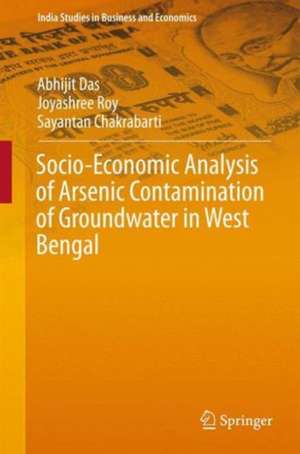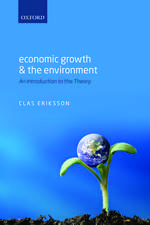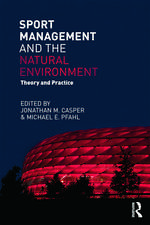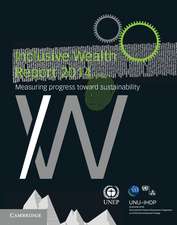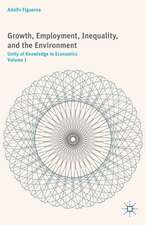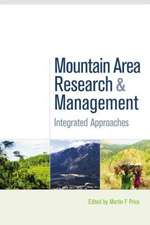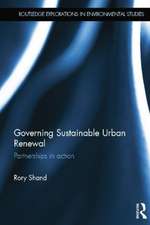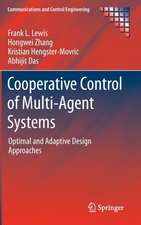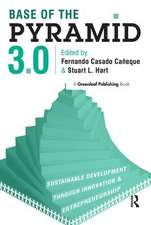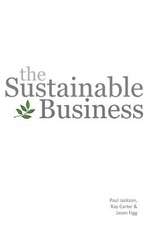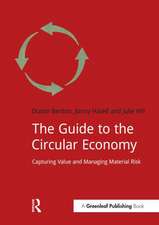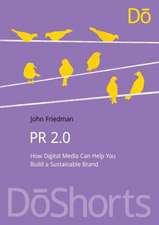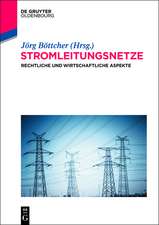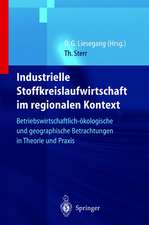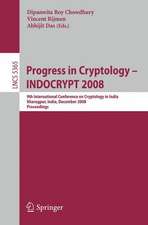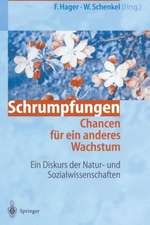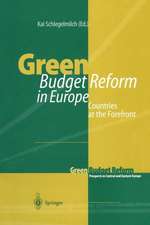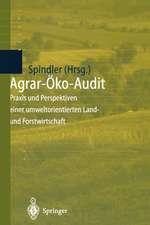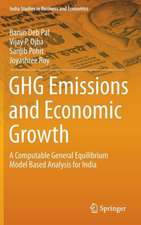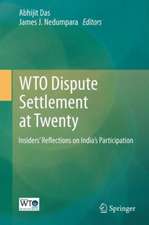Socio-Economic Analysis of Arsenic Contamination of Groundwater in West Bengal: India Studies in Business and Economics
Autor Abhijit Das, Joyashree Roy, Sayantan Chakrabartien Limba Engleză Hardback – 14 mar 2016
| Toate formatele și edițiile | Preț | Express |
|---|---|---|
| Paperback (1) | 633.68 lei 6-8 săpt. | |
| Springer Nature Singapore – 25 apr 2018 | 633.68 lei 6-8 săpt. | |
| Hardback (1) | 640.37 lei 6-8 săpt. | |
| Springer Nature Singapore – 14 mar 2016 | 640.37 lei 6-8 săpt. |
Din seria India Studies in Business and Economics
-
 Preț: 361.77 lei
Preț: 361.77 lei - 20%
 Preț: 883.20 lei
Preț: 883.20 lei - 18%
 Preț: 952.89 lei
Preț: 952.89 lei - 18%
 Preț: 1006.24 lei
Preț: 1006.24 lei -
 Preț: 186.41 lei
Preț: 186.41 lei - 15%
 Preț: 636.94 lei
Preț: 636.94 lei - 15%
 Preț: 647.27 lei
Preț: 647.27 lei - 15%
 Preț: 646.30 lei
Preț: 646.30 lei -
 Preț: 409.89 lei
Preț: 409.89 lei -
 Preț: 372.98 lei
Preț: 372.98 lei -
 Preț: 389.88 lei
Preț: 389.88 lei - 18%
 Preț: 894.03 lei
Preț: 894.03 lei - 15%
 Preț: 644.30 lei
Preț: 644.30 lei - 15%
 Preț: 528.30 lei
Preț: 528.30 lei - 15%
 Preț: 643.65 lei
Preț: 643.65 lei - 15%
 Preț: 644.82 lei
Preț: 644.82 lei - 15%
 Preț: 660.37 lei
Preț: 660.37 lei -
 Preț: 386.00 lei
Preț: 386.00 lei - 20%
 Preț: 559.74 lei
Preț: 559.74 lei - 15%
 Preț: 643.99 lei
Preț: 643.99 lei -
 Preț: 386.68 lei
Preț: 386.68 lei -
 Preț: 390.08 lei
Preț: 390.08 lei -
 Preț: 365.76 lei
Preț: 365.76 lei -
 Preț: 393.52 lei
Preț: 393.52 lei - 15%
 Preț: 656.74 lei
Preț: 656.74 lei - 24%
 Preț: 699.22 lei
Preț: 699.22 lei -
 Preț: 369.80 lei
Preț: 369.80 lei - 15%
 Preț: 642.68 lei
Preț: 642.68 lei -
 Preț: 388.90 lei
Preț: 388.90 lei - 15%
 Preț: 649.87 lei
Preț: 649.87 lei - 15%
 Preț: 645.28 lei
Preț: 645.28 lei -
 Preț: 372.66 lei
Preț: 372.66 lei -
 Preț: 389.17 lei
Preț: 389.17 lei - 20%
 Preț: 569.00 lei
Preț: 569.00 lei - 15%
 Preț: 641.85 lei
Preț: 641.85 lei -
 Preț: 392.97 lei
Preț: 392.97 lei - 15%
 Preț: 643.84 lei
Preț: 643.84 lei - 24%
 Preț: 656.29 lei
Preț: 656.29 lei - 15%
 Preț: 651.34 lei
Preț: 651.34 lei - 15%
 Preț: 641.53 lei
Preț: 641.53 lei - 20%
 Preț: 569.85 lei
Preț: 569.85 lei - 20%
 Preț: 573.20 lei
Preț: 573.20 lei
Preț: 640.37 lei
Preț vechi: 753.39 lei
-15% Nou
Puncte Express: 961
Preț estimativ în valută:
122.59€ • 126.15$ • 103.34£
122.59€ • 126.15$ • 103.34£
Carte tipărită la comandă
Livrare economică 01-15 martie
Preluare comenzi: 021 569.72.76
Specificații
ISBN-13: 9789811006807
ISBN-10: 9811006806
Pagini: 136
Ilustrații: XXI, 136 p. 9 illus., 1 illus. in color.
Dimensiuni: 155 x 235 x 14 mm
Greutate: 0.42 kg
Ediția:1st ed. 2016
Editura: Springer Nature Singapore
Colecția Springer
Seria India Studies in Business and Economics
Locul publicării:Singapore, Singapore
ISBN-10: 9811006806
Pagini: 136
Ilustrații: XXI, 136 p. 9 illus., 1 illus. in color.
Dimensiuni: 155 x 235 x 14 mm
Greutate: 0.42 kg
Ediția:1st ed. 2016
Editura: Springer Nature Singapore
Colecția Springer
Seria India Studies in Business and Economics
Locul publicării:Singapore, Singapore
Cuprins
Chapter 1. The Plight.- Chapter 2. How much is too much?.- Chapter 3. Right to water.- Chapter 4. The shades of suffering.- Chapter 5. Are we 'learning from doing'?.- Chapter 6. Who served the poison?.- Chapter 7. In love with the ‘Devil’s Water’.- Chapter 8. The assassin on the move.- Chapter 9. Malignant intentions.- Chapter 10. The opening of the Pandora’s Box.- Chapter 11. Spilling the beans.- Chapter 12. Threats to Sustainability.- Chapter 13. The Value of Human Life.- Chapter 14. Pricing the Life?.- Chapter 15. A catastrophe sans border.
Notă biografică
Dr. Abhijit Das is currently an Assistant Professor in Economics at Vijoygarh Jyotish Ray College in Kolkata, West Bengal (India). He has been researching extensively over past one decade in the various villages of rural West Bengal to understand the social, economic and political issues that drives lack of access to safe drinking water. His field research has been primarily funded by University Grants Commission of Government of India. He has published more than 15 peer reviewed articles.
Dr. Joyashree Roy, Professor of Economics, coordinates the Global Change Programme and also directs Ryoichi Sasakawa Young Leaders Fellowship Fund Project at the Jadavpur University. She is in the 2007 Nobel Peace Prize winning panel –IPCC (Intergovernmental Panel on Climate Change). She has been involved in preparation of Stern Review Report, Global Energy Assessment and many other national and global reports. She has published morethan 80 peer reviewed articles. She is researching in this area for more than two decades.
Sayantan Chakrabarti is a development communication consultant. Few of his notable projects, till date, are ‘LIFE / DEATH’ – a documentary film on the arsenic crisis; ‘Commons’ – a multi-media communication series explaining the idea and necessity of Commons; ‘Dhumil Hota Astitva’ – a film highlighting the impact of environmental pollution on heritage; ‘Mother Anonymous’ – addressing the plight of surrogate mothers; ‘Buy Buy King’ – exploring lack of consumer choice; ‘Harit Lehar’ – explaining the need of composting as a sustainable method of waste management. He also assisted Dr. Rohit Jigyasu for the paper ‘Appropriate technology for post-disaster reconstruction’ in the book ‘Rebuilding after disasters from emergency to sustainability’, published by Taylor and Francis in 2009.
Dr. Joyashree Roy, Professor of Economics, coordinates the Global Change Programme and also directs Ryoichi Sasakawa Young Leaders Fellowship Fund Project at the Jadavpur University. She is in the 2007 Nobel Peace Prize winning panel –IPCC (Intergovernmental Panel on Climate Change). She has been involved in preparation of Stern Review Report, Global Energy Assessment and many other national and global reports. She has published morethan 80 peer reviewed articles. She is researching in this area for more than two decades.
Sayantan Chakrabarti is a development communication consultant. Few of his notable projects, till date, are ‘LIFE / DEATH’ – a documentary film on the arsenic crisis; ‘Commons’ – a multi-media communication series explaining the idea and necessity of Commons; ‘Dhumil Hota Astitva’ – a film highlighting the impact of environmental pollution on heritage; ‘Mother Anonymous’ – addressing the plight of surrogate mothers; ‘Buy Buy King’ – exploring lack of consumer choice; ‘Harit Lehar’ – explaining the need of composting as a sustainable method of waste management. He also assisted Dr. Rohit Jigyasu for the paper ‘Appropriate technology for post-disaster reconstruction’ in the book ‘Rebuilding after disasters from emergency to sustainability’, published by Taylor and Francis in 2009.
Textul de pe ultima copertă
This book presents a socio-economic analysis of the issues linking technological innovation in providing arsenic-safe drinking water in rural areas. It presents concrete field based experiences of experiments and case studies depicting the plight and sufferings of people due to failed technological deployment strategies over the past two decades in West Bengal, the most arsenic-exposed state in India and also the first to act for remediation of the crisis. One of the greatest challenges in arsenic-exposed zones is to provide sustainable access to reliably arsenic-safe free water. For nearly twenty years the Government of India and national water distribution institutions in collaboration with multi-lateral funding agencies have sought to pump in money, push technology collected through global tenders, and enlist the support of non-governmental organizations (NGOs), but their efforts have yielded little success. This book is the outcome of the authors’ intensive fieldwork, guided by theconceptual framework of the latest literature on environmental economics and consumer behaviour. It presents a framework and estimates based on field level primary data. Secondary official source-based data are also collated from various scattered sources into a valuable, comprehensive collection. Lastly, the book includes a revealing analysis of factors affecting households’ participation.
Caracteristici
Presents a comprehensive documentation to arsenic-contaminated drinking water use, remedies, outcomes and a potential way forward for India Addresses developing countries’ strategies based on technological innovation Offers an important database of countries known for their disastrous impacts on arsenic-contaminated ground water use for drinking water Includes supplementary material: sn.pub/extras
